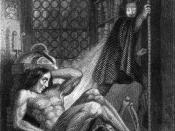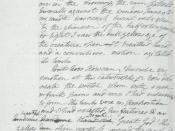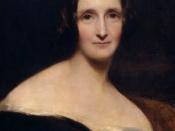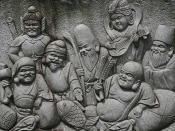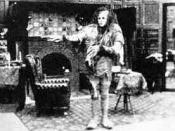Frankenstein's monster has been known to be the epitome of the misunderstood. He is a creature who has the perception and desire for good, but because of his cruel and inhuman isolation, he was overridden by evil. Victor Frankenstein played god, and then threw his creation, his child, out into the cold world to survive on his own. The monster watches the world pass him by, seeing children playing, husband and wife laughing, and a longing for companionship haunts him at every turn. It states in the Bible, "God created man in His own image, in the image of God"æ" (Gen 1:27). All men are created in the image of their God. And, therefore, the monster was created in the image of Frankenstein, for he is the creature's true creator. Frankenstein did not simply create a living, breathing creature. He created a reproduction of himself, made to think and act as he would.
However, playing god is never a safe thing to do, for God is the only being who is so pure that no evil could ever corrupt his creations and he deeply cares for each and every living thing in his kingdom. Frankenstein seems to make himself out to be almost the antithesis of the true God. It is this struggle between the ideals of the true God and this psuedo-anti-Christ that brings about much dynamism to the novel and holds the reader's attention through Shelly's sometimes long-winded descriptive prose.
As these two notions of God seem to contradict one another, the same is true for their stories of creation. Everyone knows the story of Adam and Eve in the Garden of Eden. These two perfect beings, created after the image of this perfect God, were given the perfect place to reside for all of time. Then, the narration of Frankenstein's creation story comes around and violently shatters even the slightest idea of such a picturesque scene. Frankenstein's monster was given life through the rotting, cadaverous pieces of the dead. Because of the estrangement of his creator, this barely human creation was forced upon the world, to survive the unknown dangers and learn about himself and his surroundings on his own. Also, as soon as God creates Adam, he created a companion for him, while Frankenstein's utter neglect of his creation leads him to roam the earth alone and out of touch. Elizabeth Niche mentions in her critical essay of Frankenstein, thatShelley creates the monster as the "central symbol of loneliness, yearning for human intercourse". And this statement is greatly portrayed in the monster's outpost at the edge of a family's cottage, longing to take part in their lives. He watched them go through good times and bad times and he sympathized with them, however he knew that he would never be one with them, for he was a monster. He was different; he was thrown out unsuspectingly into the world and given nothing upon which to base his beliefs or morality. The monster's god lacked the skill to govern over a living being and that is the simple reason why the monster became an outcast and Adam became the father of generations to come. This is why Shelley's novel is still read decades later, for it takes the widely believed and worshipped story of creation and rips it apart and creates a horrible picture of a destroyed life in its place.
Moreover, the idea of Frankenstein as the antithesis to the true God can be seen in his reaction towards his creation. At first glance, Victor immediately abhors the creature that he wrought upon the earth. "How can I describe my emotions at this catastrophe, or how delineate the wretch whom with such infinite pains and care I had endevoured to form?" (Shel. 52) He is not so much scared of the size or appearance of the creature, but of the how much of him was part of that monster. He knew that this creature had no transcendental other to look to other than himself. There lies absolute terror in the bringing of a child into the world when one is unprepared to care for it, especially into the cold, lonely world of Victor Frankenstein. David Ketterer talks of a "blackness" and "distance" that surrounds the monster in one of his critiques of the novel. This same type of bleak nothingness can be seen in the life of Victor. For it is the beautiful Elizabeth that makes Victor the outcast in his family, then as a final blow, in his mind, she kills his already detached mother and sends him spiraling into a world of utter loneliness. Victor found himself lacking companionship, and along with his knowledge of science, he brought forth the monster. This monster was created in his image, with his beliefs and with his soul. This child of this anti-Christ-like figure of darkness roamed the earth, slaughtering without conscience. The monster did all the things Victor had subconsciously wanted to do all his life. As Adam was a creation of good, the creature was a creation of evil, and was made in the likeness of evil.
Victor led a saddened life. His only happiness came to him in seclusion with his work of art, his "new species that would bless [him] as its creator and source" (Shel. 49). Life was created by a depressed and lonely being with evil at his core. Shelley seems to arouse the reader's attention with this direct opposition to the God of the Bible through Victor's personification. She destroys the normal ideals of what traits a god and creator of life should have. She fashions an alternate story of creation, one of sadness and fear rather than one of life in total euphoria. Mary Shelley is a skilled author and she provokes the reader to follow a different path of beliefs and enter into her world, in which the creation of life does not lie solely on the true God, but also on those that are His exact antithesis.
